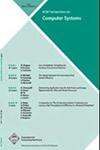不带锁的并发编程
IF 1.8
4区 计算机科学
Q2 COMPUTER SCIENCE, THEORY & METHODS
引用次数: 295
摘要
互斥锁仍然是对共享内存数据结构进行并发控制的事实上的机制。然而,它们表面上的简单是具有欺骗性的:很难设计可伸缩的锁定策略,因为锁可能包含优先级反转、死锁和传输等问题。此外,在构建复合操作时,可扩展的基于锁的系统不容易组合。在寻找这些问题的解决方案时,人们对非阻塞系统产生了兴趣,这些系统通过避免互斥来保证可扩展性和鲁棒性,同时仍然确保安全性。然而,用于构建非阻塞系统的现有技术很少适合实际使用,这会增加大量的存储开销,序列化无冲突的操作,或者需要在当前cpu上不易获得的指令。在本文中,我们将介绍三个api,它们使开发任意数据结构的非阻塞实现变得更加容易。第一个API是一个多字比较与交换操作(MCAS),它自动更新一组内存位置。这可以用于将数据结构从一种一致状态推进到另一种一致状态。第二个API是基于单词的软件事务性内存(WSTM),它允许比MCAS更直接地重用顺序代码,并且在读取位置而不是更新位置时提供更好的可伸缩性。第三个API是基于对象的软件事务性内存(OSTM)。OSTM允许比WSTM更简单的实现,但代价是重新设计代码以使用OSTM对象。我们给出了这三种api的实际实现,它们基于当今所有主要CPU系列的操作构建而成。我们通过使用这些api来构建高度并发的跳跃表和红黑树来说明这些api的使用。我们将最终实现的性能与其他实现以及基于高性能锁的系统进行比较。这些结果表明,构建有用的非阻塞数据结构是可能的,其性能与复杂的基于锁的设计相当,甚至更好。本文章由计算机程序翻译,如有差异,请以英文原文为准。
Concurrent programming without locks
Mutual exclusion locks remain the de facto mechanism for concurrency control on shared-memory data structures. However, their apparent simplicity is deceptive: It is hard to design scalable locking strategies because locks can harbor problems such as priority inversion, deadlock, and convoying. Furthermore, scalable lock-based systems are not readily composable when building compound operations. In looking for solutions to these problems, interest has developed in nonblocking systems which have promised scalability and robustness by eschewing mutual exclusion while still ensuring safety. However, existing techniques for building nonblocking systems are rarely suitable for practical use, imposing substantial storage overheads, serializing nonconflicting operations, or requiring instructions not readily available on today's CPUs.
In this article we present three APIs which make it easier to develop nonblocking implementations of arbitrary data structures. The first API is a multiword compare-and-swap operation (MCAS) which atomically updates a set of memory locations. This can be used to advance a data structure from one consistent state to another. The second API is a word-based software transactional memory (WSTM) which can allow sequential code to be reused more directly than with MCAS and which provides better scalability when locations are being read rather than being updated. The third API is an object-based software transactional memory (OSTM). OSTM allows a simpler implementation than WSTM, but at the cost of reengineering the code to use OSTM objects.
We present practical implementations of all three of these APIs, built from operations available across all of today's major CPU families. We illustrate the use of these APIs by using them to build highly concurrent skip lists and red-black trees. We compare the performance of the resulting implementations against one another and against high-performance lock-based systems. These results demonstrate that it is possible to build useful nonblocking data structures with performance comparable to, or better than, sophisticated lock-based designs.
求助全文
通过发布文献求助,成功后即可免费获取论文全文。
去求助
来源期刊

ACM Transactions on Computer Systems
工程技术-计算机:理论方法
CiteScore
4.00
自引率
0.00%
发文量
7
审稿时长
1 months
期刊介绍:
ACM Transactions on Computer Systems (TOCS) presents research and development results on the design, implementation, analysis, evaluation, and use of computer systems and systems software. The term "computer systems" is interpreted broadly and includes operating systems, systems architecture and hardware, distributed systems, optimizing compilers, and the interaction between systems and computer networks. Articles appearing in TOCS will tend either to present new techniques and concepts, or to report on experiences and experiments with actual systems. Insights useful to system designers, builders, and users will be emphasized.
TOCS publishes research and technical papers, both short and long. It includes technical correspondence to permit commentary on technical topics and on previously published papers.
 求助内容:
求助内容: 应助结果提醒方式:
应助结果提醒方式:


